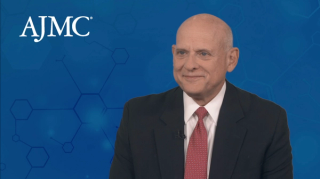
Clinical
Latest News
Latest Videos

More News

Genetically decreased vitamin D levels are unlikely to have a large effect on risk of type 1 diabetes, according to results of a Mendelian randomization study published in PLOS Medicine.

Among 6 sphingosine-1-phosphate (S1P) receptor modulators evaluated for use in patients with multiple sclerosis (MS), a new meta-analysis shows amiselimod had the highest efficacy.

The FDA has granted priority review of the supplemental New Drug Application for ruxolitinib for the treatment of steroid-refractory chronic graft-versus host disease (GVHD).

Elderly patients who recently had a heart attack and fit the criteria for obstructive sleep apnea were shown to be at greater risk for heart rhythm disorders, such as arrhythmia and coronary artery disease, as well as for major adverse cardiovascular and cerebrovascular events.

Health-related quality of life was maintained when treating relapsed/refractory multiple myeloma (RRMM) with daratumumab in combination with bortezomib and dexamethasone.

Advocates for patients with progressive multiple sclerosis (MS) want changes in study designs on emerging therapies to speed development and better align with the needs of researchers and patients.

In their recently published review, the researchers offer a detailed look at the drugs and toxins associated with drug- and toxin-induced pulmonary arterial hypertension (PAH), as various associations have come to light in recent decades.

Patients with chronic kidney disease (CKD) healthy enough not to have seen a specialist have higher hospitalization rates than the general population, according to a recent study.

The results from an analysis of patients from 12 rheumatology centers treated with secukinumab for psoriatic arthritis were in line with earlier pivotal trials, the researchers said.

The current guidance emphasizes that the mRNA-based Pfizer/BioNTech and Moderna vaccines are safe for people with multiple sclerosis (MS) taking disease modifying therapies (DMTs).

The researchers prefaced their study by highlighting that pulmonary arterial hypertension (PAH) and all forms of PH continue to be highly morbid and sometimes fatal, particularly in cases requiring hospitalization in the intensive care unit.

A group of researchers discuss the clinical features and diagnosis of acute hepatic porphyrias (AHP) as well as their take on the approval of the first small interfering RNA (siRNA)-based therapy for the treatment of these patients.

Lidocaine throat spray can be an effective treatment for refractory chronic cough, according to a recent study.

On this episode of Managed Care Cast, we highlight a new feature on AJMC.com, the website of The American Journal of Managed Care®, called Clinical Spotlight, where our editors provide a series of interviews with leading experts in certain specialties.

Novartis' drug, which combines sacubitril and valsartan, is the first to directly treat patients with heart failure with preserved ejection fraction.

Researchers from the Children’s Medical Center Research Institute at the University of Texas Southwestern discovered a potential treatment for patients with non–small cell lung cancer (NSCLC) who have KRAS and LKB1 mutations.

Older adults with acute myeloid leukemia (AML) saw increased overall and relapse-free survival, as well as preserved quality of life, following oral administration of 300-mg azacitidine.

Genentech's tiragolumab, a novel immunotherapy for non-small cell lung cancer with PD-L1 expression, is the first anti-TIGIT therapy to be granted Breakthrough Therapy Designation.

Ohio dermatologist Matthew J. Zirwas, MD, offers his view on what step therapy would look like in patients with atopic dermatitis.

Abatacept was shown to have a 9% increase in likelihood of achieving remission compared with conventional therapy for rheumatoid arthritis (RA), which the researchers contribute to the treatment’s lower discontinuation rates.

Patients being treated for multiple myeloma with carfilzomib should have cardiopulmonary screening and monitoring due to the risk of developing pulmonary arterial hypertension (PAH).

In the placebo-controlled trial, 86% of participants who received semaglutide attained at least a 5% reduction in total body weight.

Mortality risk stratification can identify patients at higher risk of mortality and readmissions for prevention strategies. Other patients should be the focus of length-of-stay reduction strategies.

A new study assessed the genomic alterations identified by ctDNA analysis compared with tissue-based comprehensive genomic profiling in patients with metastatic castration-resistant prostate cancer.

Breast cancer oncologists explore more recent advances using oral chemotherapies to treat metastatic breast cancer.
















